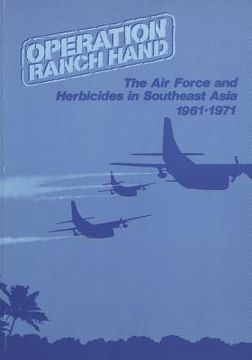Operation Ranch Hand: The Air Force and Herbicides in Southeast Asia, 1961-1971 (en Inglés)
Reseña del libro "Operation Ranch Hand: The Air Force and Herbicides in Southeast Asia, 1961-1971 (en Inglés)"
Since the dawn of powered flight, there has been debate about the uses of aviation in war. The air weapon could be, and has been, used for a varietyof missions: to gain control of the skies, to bomb an enemy's population or war-making resources, to support armies and navies in battle, to interdictthe flow of men and materiel to the battlefield, for observation, reconnaissance, the gathering of intelligence, to transport men and supplies, and forvirtually every other aspect of modern combat.One of aviation's more unusual military applications occurred in Southeast Asia, where American and Vietnamese planes sprayed large areas of Vietnam and Laos with herbicides in an effort to deny cover and concealment to the enemy, and to destroy his food supply.Herbicides, or weed-killing chemicals, had long been used in American agriculture. After World War I, the military of various nations realized their potential for war and developed techniques to use them. Although the Italians had used lethal chemicals delivered from the air in Abyssinia in 1936, the Allies and Axis in World War II abstained from using the weapon either because of legal restrictions, or to avoid retaliation in kind. During the early 1950s, the British on a limited basis employed herbicides to destroy the crops of communist insurgents in Malaya.In 1961, President Ngo Dinh Diem of South Vietnam asked the United States to conduct aerial herbicide spraying in his country. In August of thatyear, the South Vietnamese Air Force initiated herbicide operations with American help. But Diem's request launched a policy debate in the White House and the State and Defense Departments. On one side were those who viewed herbicides as an economical and efficient means of stripping the Viet Cong of their jungle cover and food. Others, however, doubted the effectivenessof such a tactic and worried that such operations would both alienate friendly Vietnamese and expose the United States to charges of barbarismfor waging a form of chemical warfare. Both sides agreed upon the propaganda risks of the issue. At last, in November 1961, President Kennedy approved the use of herbicides, but only as a limited experiment requiring South Vietnamese participation and the mission-by-mission approvalof the United States Embassy, the Military Assistance Command Vietnam, and South Vietnam's government.Operation Ranch Hand, the designation for the program, began in January 1962. Gradually limitations were relaxed and the spraying becamemore frequent, and covered larger areas. By the time it ended nine years later, some eighteen million gallons of chemicals had been sprayed on an estimated twenty percent of South Vietnam's jungles, including thirty-six percent of its mangrove forests. The Air Force also carried out herbicide operations in Laos from December 1965 to September 1969 with the permission of the Laotian government.

